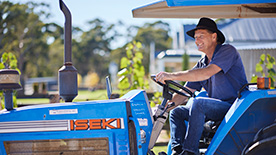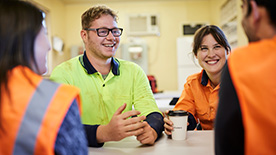Return to work coordinator profile - Tash Nicol
 Tash has been undertaking the Return to Work Coordinator role at Revolution Roofing since 2015. Besides being an outstanding support to her injured workers and building close relationships with her claims managers, Tash has gone above and beyond, tackling the stigma around work injuries and the Return to Work scheme through manager education. Her efforts have not gone unnoticed by Mobile Claims Manager Leila Obeid, who tells us that Tash ‘is a hard-working, dedicated individual who really cares and shows empathy to her staff’. Tash ensures things are in place to support the wellbeing of staff and makes herself available for all and every meeting with an injured employee.
Tash has been undertaking the Return to Work Coordinator role at Revolution Roofing since 2015. Besides being an outstanding support to her injured workers and building close relationships with her claims managers, Tash has gone above and beyond, tackling the stigma around work injuries and the Return to Work scheme through manager education. Her efforts have not gone unnoticed by Mobile Claims Manager Leila Obeid, who tells us that Tash ‘is a hard-working, dedicated individual who really cares and shows empathy to her staff’. Tash ensures things are in place to support the wellbeing of staff and makes herself available for all and every meeting with an injured employee.
Name: Tash Nicol
Position: Human Resources Manager
Organisation: Revolution Roofing is a dynamic and fast paced manufacturing business operating in 4 states, with 140 employees based in South Australia. We have gained significant market share in the last decade by keeping a strong focus on customer service. We acknowledge that when we take care of our team, they will take care of our customers and implementing this principle into our core business strategies has been a fundamental part of our success.
What do you think are some of the challenges that a Return to Work coordinator within the Building and Construction Industry might face in supporting an injured workers recovery and return to work?
The biggest challenge is the stigma associated with suffering a work-related injury. This stigma creates fear and it can cause a culture of non-reporting of injuries. This is a key aspect of the return to work end to end process that I have been working to change. Like any cultural shift, it takes a lot of time and effort to effect real and long-lasting change, but year on year we continue to see improvements. Another challenge I personally face, and I feel is quite common, is undertaking the dual role of HR Manager and RTW Coordinator and the difficulties often associated with finding a happy medium between both functions, as the two roles often align with different strategies. I manage this challenge by ensuring consistency and open communication with all parties, and keeping industrial matters separate from the return to work process.
Can you tell us a little bit about how you support your injured workers throughout their recovery and return to work?
I maintain an active participation in a workers return to work plan, including making myself available to attend doctor’s appointments and support meetings. I have streamlined our internal systems where possible to make the process less daunting for workers. I also recognise that whilst returning to work is important, being able to return to normal life is much more important and so I factor this in when dealing with an injured worker. I encourage them to set personal goals, in addition to their work related goals, and I regularly follow up these goals and show genuine interest in their achievements.
You seem to be a really proactive and engaged Coordinator. Can you tell us why you think this is important?
I enjoy my job! That in its own right is extremely important, but it is also important for an injured worker that I remain engaged and diligent. I feel as a RTW Coordinator I am an integral part of their return to work process and my involvement has a direct impact on the success of a return to work plan.
Can you tell us about your management education program and the impact that it has had on how return to work is managed and perceived in the workplace?
I provide support to managers and supervisors, in order to positively influence the ways in which they manage return to work plans. Management support and education is key in ensuring return to work plans run smoothly and I have found gaining buy-in from managers and supervisors when creating a return to work plan greatly improves their participation in the plan. I also ensure I provide clear and transparent advice to supervisors, whilst adhering to confidentiality requirements.
You’ve been praised for showing good empathy and genuine care towards your staff, do you have any advice to other Return to Work Coordinators about how they can show empathy to their own staff?
I feel the soft skills such as empathy and understanding are critical for a RTW Coordinator to possess, in order to succeed in the role. Empathy promotes connection, trust and honest communication. Listening, understanding and relating are some ways I effectively apply empathy in all aspects of my work.
What other advice would you give to Return to Work Coordinators?
Understand your people. Recognise we are all on the same team working towards the same goals. Don’t allow yourself to become static within your role, utilise all the resources and networking opportunities available to you to widen your skills. The task of developing yourself is never finished.






 Date printed: 23 Jul 2024
Date printed: 23 Jul 2024

